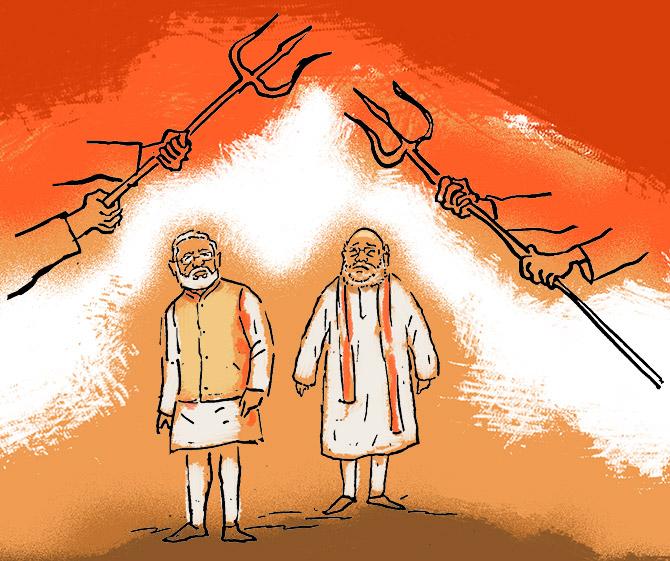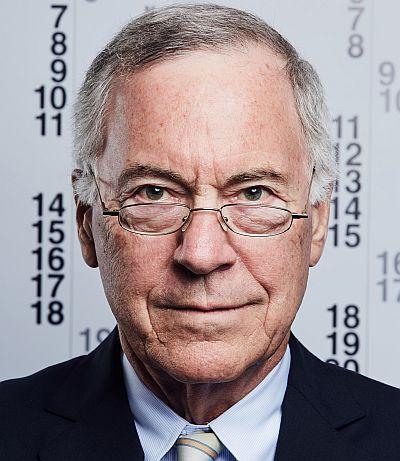'Outside investors don't want to get tangled up in a religious war.'

Narendra Damodardas Modi is making all the wrong moves by stoking sectarian feuds and polarising the Indian population, according to American economist and academician Steve Hanke, below.
His argument primarily addresses the issues of national stability and prosperity.
Professor Hanke has been railing on Twitter against the steps the Indian government have taken against protesters across the country, including in Kashmir and Assam.
He has been highlighting the attacks on Indian universities, and the chaos resulting from the implementation of the Citizenship (Amendment) Act and the onerous requirements of the looming National Registry of Citizens that could have a disproportionate impact on Muslims.
"My main concern is that once you get into ethnicity and religion, and drag those two topics into a political agenda, you are asking for trouble," Professor Hanke tells Rediff.com Contributor P Rajendran in New York.
Modi, Professor Hanke says, "wants to play more and more ethnicity and religious cards."
"It is a miscalculation in the immediate run. It creates a lot of investment problems. Outsiders looking at India may not know about contemporary history. They see problems with the police and in civil society, raids on university campuses."
According to Professor Hanke, civil strife "distracts politicians from doing what they should be doing."
"The primary thing is the economy," he said, saying that while India has a potential growth rate of 8 percent, this year it will have trouble getting even to 5 percent.
Professor Hanke argues against anything that will disrupt a country's business environment, given his interest in the global economy, and his championship of capitalism.
He is a professor of applied economics and the founder and co-director of the Institute for Applied Economics, Global Health, and the Study of Business Enterprise at The Johns Hopkins University in Baltimore.
He is a senior fellow and director of the Troubled Currencies Project at the Cato Institute in Washington, DC, a senior advisor at the Renmin University of China's International Monetary Research Institute in Beijing, a special counselor to the Center for Financial Stability in New York, a contributing editor at Central Banking in London, a contributor at Forbes and a currency and commodity trader.
Among other things, Professor Hanke was a senior economist on President Ronald W Reagan's council of economic advisers in 1981-1982, his focus being on privatisation.
He was also chief economic adviser to Suharto, Indonesia's president and dictator, to help resolve the Asian financial crisis of 1997.
"There is nothing without stability," he points out, saying that for the Indian prime minister, there is "negative confidence beyond his base."
India is still a poor country, he explains, and investors like stability and high growth, which could be hampered by protests and repressive measures.
He brushes aside the argument that a primarily Hindu India is the vision that Modi's Bharatiya Janata Party and its parent organisation, the Rashtriya Swayamsevak Sangh, had sought, and how Modi could satisfy his base.
"That's his calculus. In local elections, he and his party are not doing well," Professor Hanke says.
He agrees with what some Indian commentators described as the TINA factor -- 'There Is No Alternative'.
"The challengers are very weak," he concedes.
"If the challengers were stronger, the course Modi and the party have taken... they would not be taking."
He said the biggest hurdles were those facing the economy.
"State banks are at the epicentre of the problem. They created a credit explosion and (now there are) credit lapses," he says, adding that as the economy progressively slowed down, bad debts have begun to show up.
He also blames shadow banks, which are actually not banks but finance companies that also lent money to people with weak credit.
"The elephant in the room is the bureaucracy," Professor Hanke says, arguing for sharply shrinking it, and also privatising public sector banks, and deregulating the economy.
According to Professor Hanke, the current system was a result of Brahmins educated in British schools being seduced by the British socialist movement at the time of Independence.
"Modi has wasted his time with ethnic and religious things; he should be rationalising the bureaucracy so it is parasitising less on society," he says.
"Doing business in India is a nightmare," Hanke said.

He dismisses the possibility that Modi is playing the long game, aiming to keep his promises even at the cost of economic reversals in the short term.
"He'll be dead before the long run. You've got to be a Margaret Thatcher, Ronald Reagan or... The best example is Singapore. Lee Kwan Yew and Deng (Xiaoping, China's late leader) are the people you want to emulate. In China, Deng was a big guy. (The Chinese economy) was like an onion. It was all red. The Communist party owned it all," Hanke says, describing the situation prior to the opening of the Chinese economy.
"The Uighur problem was on the backburner," he says, while not addressing the authoritarianism and civic unrest that marked the period of reforms that converted China into a market economy.
He says the problem in India is that there is no one like Deng, and that it was not anything like China.
Professor Hanke feels the best model for India was one based on Singapore, which was poor and risked being riven by civil war at the time of its independence in 1965.
He describes how Lee Kwan Yew, its prime minister for three decades, made it an economic powerhouse, discouraging ethnic and religious strife, and focusing on five main themes:
- Stable money, relying on automatic systems to keep the value steady.
- A refusal of all foreign aid.
- Producing a first-world competitive, private enterprise system, relying on light taxation and regulation, and free trade.
- Ensuring personal security, and protection of private property.
- Putting together a small, transparent government that reduced red tape, but was run by the best civil servants who got top wages.
By comparison, Professor Hanke believes, Modi is pushing India into a backwater.
"Outside investors don't want to get tangled up in a religious war," he says, again stressing, "It's a wise idea for politicians to avoid ethnic and religious issues."











 © 2025
© 2025